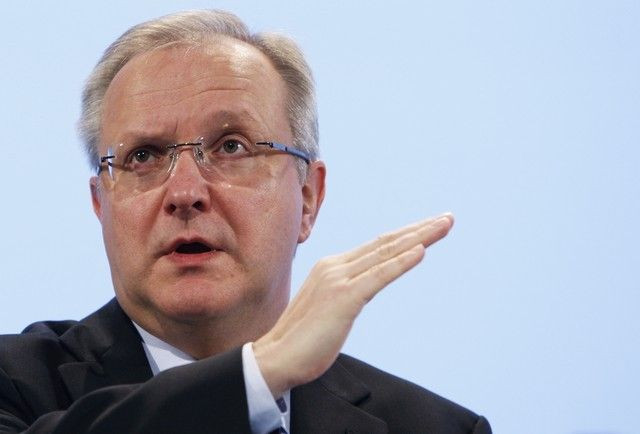EU's Rehn seeks stronger fund, Portugal sells bonds

The European Union's top economics official called on Wednesday for a strengthening of Europe's financial safety net as Portugal, widely seen as the next candidate for a bailout, returned to the market for funds.
The euro zone's two main powers, Germany and France, praised Lisbon's austerity measures but said it needed to convince investors it was implementing reforms effectively to control its public finances and revive a stagnant economy.
EU Monetary Affairs Commissioner Olli Rehn, writing in the Financial Times, said finance ministers should look next week at reinforcing the effective lending capacity of the euro zone's rescue fund and making it more flexible to calm debt markets.
The effective lending capacity of the current European Financial Stability Facility should be reinforced and the scope of its activity widened, he said.
We need to review all options for the size and scope of our financial backstops -- not only for the current ones but also for the permanent European stability mechanism too.
The European Financial Stability Facility (EFSF), created last May for euro zone countries that get shut out of bond markets, has a theoretical capacity of 440 billion euros ($570.3 billion) but can effectively only lend 250 billion euros because of cash buffers agreed to obtain a top notch credit rating.
Portugal was expected to pay record high premiums to place its debt on Wednesday, analysts said, but recent bond-buying by the European Central Bank should avert a dramatic rise in yields to levels that prompt the country to seek a bailout.
In its first sale of 2011, the heavily indebted government was offering up to 1.25 billion euros in four- and 10-year bonds.
Credit Agricole rate strategist Peter Chatwell said growing yields would add to longer-term concerns about Portugal's debt and liquidity, but it's not like it's going to be a make-or-break auction.
TRAUMATIC MEMORIES
Given traumatic memories of two IMF interventions since the 1974 revolution that overthrew Europe's longest-running dictatorship, Socialist Portuguese Prime Minister Jose Socrates is determined to avoid applying for aid if at all possible.
The issue has taken center-stage in Portugal's presidential election campaign with both of the main candidates for the January 23 ballot trying to use it to discredit the other.
Socrates, who heads a minority government dependent on opposition votes to pass legislation, has insisted his country is ahead of target in reducing its deficit and does not face the acute problems that drove Greece and Ireland to seek bailouts.
Optimism that a more effective EFSF may be in the works helped reduce the risk premium investors demand to hold Spanish and Italian government bonds rather than benchmark German debt, but the Portuguese yield spread was unchanged.
Euro zone sources told Reuters on Tuesday that the bloc's finance ministers were likely to consider next week the option of raising the effective lending capacity of the rescue fund as part of efforts to calm sovereign debt markets.
But sources cautioned that a firm decision was unlikely to be taken on Monday and any increase in lending capacity could be limited by the dual constraints of credit ratings and the need to avoid a new round of parliamentary approvals, particularly in Germany.
The risk that parlous government finances after the global financial crisis will trigger sovereign debt defaults was cited as the number one threat facing the world in 2011 in the World Economic Forum's annual Global Risks report released on Wednesday.
Europe's safety net is meant to buy time to allow heavily indebted governments to restore order in their public finances to make their debt burden manageable, but many economists believe Greece and Ireland will eventually have to restructure their debt, forcing losses on taxpayers and/or bond holders.
BATTLING
French Economy Minister Christine Lagarde said Portugal was making good progress with trimming its public debt and deficit but needed to continue.
(It) is producing results which are better than the commitments it made and I think that's reassuring for investors, she told France 2 television. It is imperative that it continue because structural reforms are necessary.
German Chancellor Angela Merkel, speaking on a visit to Cyprus late on Tuesday, said Portugal had taken very important measures and appeared to be implementing them seriously.
I believe that Portugal can also prove that it is seriously implementing these steps, and that is the most important thing right now, she said.
Paris and Berlin have denied reports from a senior euro zone source that they are pushing Lisbon behind the scenes to accept a bailout soon to avoid contagion spreading to much larger Spain, the euro zone's fourth largest economy.
Increasing the EFSF's lending capacity could reduce market pressure by signaling that Europe could cope even if Spain required help.
© Copyright Thomson Reuters 2024. All rights reserved.





















